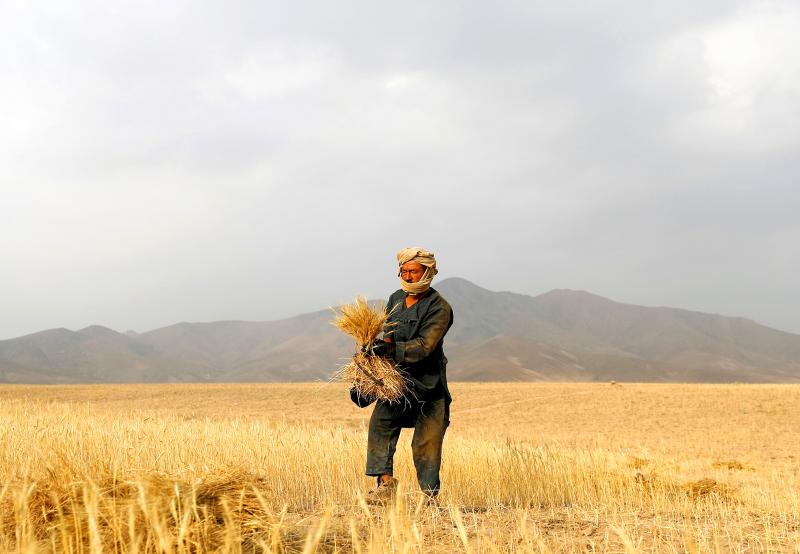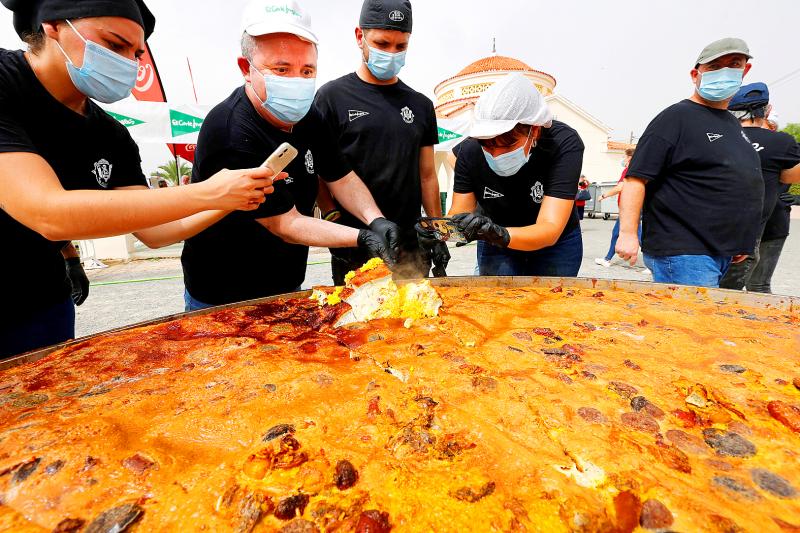Food production around the world will suffer as global heating reaches 1.5 degrees Celsius, with serious effects on the food supply in the next two decades, scientists have warned, following the biggest scientific report yet on the climate crisis.
Rising temperatures will mean there will be more times of year when temperatures exceed what crops can stand, according to the Intergovernmental Panel on Climate Change (IPCC), in its sixth assessment report published on Monday.
Politicians around the world continued to respond to the report. Boris Johnson, British prime minister, published a video on his social media channel, setting out the four areas he wanted to focus on in the run up to the autumn’s climate change summit: outlawing coal for power generation by 2040, ditto fossil fuels for transport; getting countries to stump up cash to help poorer nations with climate change; and ending “the massacre of the forests.”

Photo: REUTERS
US president Joe Biden was under pressure to get his climate change legislation passed after saying “We can’t wait to tackle the climate crisis. The signs are unmistakable. The science is undeniable. And the cost of inaction keeps mounting.”
In Australia Prime Minister Scott Morrison pointed the finger at China, saying in a press conference on Tuesday that it could not be ignored that the developing world accounts for “two-thirds of global emissions,” and adding that China’s emissions “accounted for more than the entire OECD combined.”
The Chinese government issued a statement saying that “China has insisted on prioritizing sustainable, green and low-carbon development.” It added that President Xi Jinping (習近平) intended to “strictly control” the growth of coal power plants.

Photo: EPA-EFE
Challenges to our food production systems will be just one of the impacts, the report found: changing rainfall patterns will leave many areas vulnerable to drought, while extreme weather will make agriculture harder and damage crops.
LOOMING FOOD CRISIS
Bonnie Waring, senior lecturer at the Grantham Institute, Imperial College London, said: “Across the globe, over 80 percent of calories consumed come from just 10 crop plants, including rice, maize and wheat. Although a few staple crops — like soybean — may do better in a warmer future, warming temperatures and increasingly frequent droughts are likely to reduce yields of these key crops across many regions of the globe.”
The full spectrum of the damage will not be fully revealed until next year, when the IPCC publishes the second part of its landmark assessment, which will cover the impacts of climate breakdown on key areas of human life and the planet.
The first part of the report, published this week, deals with the physical science basis of climate change — that is, what will happen to the atmosphere, seas and land — but from those finding many of the likely harms to agriculture can already be assessed.
Ilan Kelman, professor of disasters and health at University College London, said: “If we fail to act, then significant numbers of people could face major problems with food. Increased heat and humidity will harm current crops and livestock, with droughts and floods having the potential to wipe out harvests as well. Massive shifts in agricultural practices, including changes to crops and livestock, would be needed to counter these effects.”
David Reay, professor of carbon management at Edinburgh University, added: “For key staples like rice — the main source of nourishment for over a billion of us — warming is not just changing rainfall patterns, it is threatening the glacial meltwaters that irrigate millions of hectares of South Asian croplands.”
‘WET BULB’ TEMPERATURES
Extreme weather this year has also revealed another major impact: when “wet bulb” temperatures soar, people cannot safely work in the fields. These conditions occur when both heat and humidity are high, and people’s bodies cannot wick away sweat efficiently.
Some people have speculated that warming temperatures could be good for agriculture, by allowing for longer growing seasons in northern latitudes, and from the fertilizing effect of more carbon dioxide in the atmosphere, which plants absorb from the air as they grow. Mark Maslin, professor of earth system science at UCL, dismissed these claims.
“Any benefits are likely to be small and will be outweighed by the damages and the risk of extreme weather,” he said, warning that food prices rises will also be a major danger.
Animal husbandry will also be affected, though reducing our reliance on meat and dairy products is likely to be one of the key ways of slowing global heating: Methane, much of it from agricultural sources including ruminants and manure, is one of the leading causes of climate breakdown identified in the IPCC assessment report.
Rob Percival, head of food and health policy at the UK’s Soil Association, said people did not need to give up eating or producing meat, but that food consumption patterns needed to change alongside food production.
“A rapid transition to agroecological farming offers a healthier and more sustainable approach to producing our food and requires a shift in our diets to less and better meat, with an emphasis on fresh fruit and vegetables and the consumption of more pulses and legumes,” he said.
Shefali Sharma, director of the Institute for Agriculture and Trade Policy, said that all areas would be affected, not just the poorer regions of the world where many farmers are already vulnerable, and that all governments must act urgently.
“Governments must begin taking urgent steps now to build resilience into agri-food systems,” he said. “This means building soil health, agricultural biodiversity in crops and animals, serious extension work that builds on traditional knowledge and local breeds and seeds and adequate support for adaptation.”

Jacques Poissant’s suffering stopped the day he asked his daughter if it would be “cowardly to ask to be helped to die.” The retired Canadian insurance adviser was 93, and “was wasting away” after a long battle with prostate cancer. “He no longer had any zest for life,” Josee Poissant said. Last year her mother made the same choice at 96 when she realized she would not be getting out of hospital. She died surrounded by her children and their partners listening to the music she loved. “She was at peace. She sang until she went to sleep.” Josee Poissant remembers it as a beautiful

March 2 to March 8 Gunfire rang out along the shore of the frontline island of Lieyu (烈嶼) on a foggy afternoon on March 7, 1987. By the time it was over, about 20 unarmed Vietnamese refugees — men, women, elderly and children — were dead. They were hastily buried, followed by decades of silence. Months later, opposition politicians and journalists tried to uncover what had happened, but conflicting accounts only deepened the confusion. One version suggested that government troops had mistakenly killed their own operatives attempting to return home from Vietnam. The military maintained that the

Before the last section of the round-the-island railway was electrified, one old blue train still chugged back and forth between Pingtung County’s Fangliao (枋寮) and Taitung (台東) stations once a day. It was so slow, was so hot (it had no air conditioning) and covered such a short distance, that the low fare still failed to attract many riders. This relic of the past was finally retired when the South Link Line was fully electrified on Dec. 23, 2020. A wave of nostalgia surrounded the termination of the Ordinary Train service, as these train carriages had been in use for decades

Lori Sepich smoked for years and sometimes skipped taking her blood pressure medicine. But she never thought she’d have a heart attack. The possibility “just wasn’t registering with me,” said the 64-year-old from Memphis, Tennessee, who suffered two of them 13 years apart. She’s far from alone. More than 60 million women in the US live with cardiovascular disease, which includes heart disease as well as stroke, heart failure and atrial fibrillation. And despite the myth that heart attacks mostly strike men, women are vulnerable too. Overall in the US, 1 in 5 women dies of cardiovascular disease each year, 37,000 of them